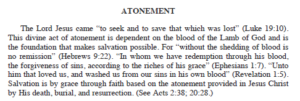Then & Now: Changes to the United Pentecostal Articles of Faith: Atonement. Comparing 1952 to 2022.
The United Pentecostal Church formed in 1945. Here we will briefly examine what the Articles of Faith have stated about atonement.
There was no mention in the Articles about atonement when the UPCI formed and it continued like that for decades. It wasn’t until 2012 that it was added and it first appeared in the 2013 UPCI Manual.

The 2022 version of the Articles of Faith states the following concerning atonement:
“The Lord Jesus came ‘to seek and to save that which was lost’ (Luke 19:10). The divine act of atonement is dependent on the blood of the Lamb of God and is the foundation that makes salvation possible. For ‘without the shedding of blood is no remission’ (Hebrews 9:22). ‘In whom we have redemption through his blood, the forgiveness of sins, according to the riches of his grace’ (Ephesians 1:7). ‘Unto Him that loved us, and washed us from our sins in his own blood’ Revelation 1:5. Salvation is by grace through faith based on the atonement provided in Jesus Christ by His death, burial and resurrection (Acts 2:38; 20:28).”
On August 29, 2012, David Bernard announced in an email, “In 2011 the General Conference approved two amendments to the Articles of Faith. To be adopted, all such amendments must be approved by a two-thirds vote in two-thirds of the districts. The article entitled ‘Atonement’ was approved by 100% of the districts and the amendment to ‘Conscientious Scruples’ was approved by 79% of the districts, so both are now part of the Articles of Faith.”
In Thomas Fudge’s 2003 book, Christianity Without the Cross, he wrote on page 135, “Historic Christianity has often affirmed the centrality of the cross as the very heart and focus of the Christian faith.” On the following page he continues, “It is of note that the ‘Articles of Faith’ of the United Pentecostal Church contain no substantive mention of the cross or the doctrine of atonement.” Thus, part of the reason for the title of Fudge’s book.
Continuing on page 142-143, “It is possible to argue that the atonement is misunderstood in the United Pentecostal Church, detached as it is from the life and living of Christ, and restricted to the moment of death on the cross which raised other theological, principally Christological, problems. It must be admitted that the UPC preaches the crucifixion, but not the cross. The latter is the power of God for salvation. The details of the suffering of Christ are enumerated but the message of the cross itself lacks significant analysis. There is a crucial difference between the crucifixion and the cross. The idea of redemption is understood in United Pentecostal theology as a legal transaction, which helps to explain the absence of emphasis on grace. The lack of theological articulation devoted to the preaching of the cross, grace, justification and the atonement can be put down to the stress placed on the doctrines associated with the Name of Jesus and Acts 2:38.”
Thomas Fudge spoke with 139 ministers and observed that there was a “clear division of opinion regarding the place of the cross in the theology of the movement generally and specifically as it relates to the doctrine of salvation.” (page 136) The interviews noted in this section of his book went back as far as 1998. Even with those he spoke to in the 1990s, some ministers felt there should be a mention of atonement in the Articles of Faith.
It only took more than a decade after those interviews for the organization to do so.
Then & Now: Changes to the United Pentecostal Articles of Faith Part 1: Public School Activities
Then & Now: Changes to the United Pentecostal Articles of Faith Part 2: Holiness
Then & Now: Changes to the United Pentecostal Articles of Faith Part 3: Fundamental Doctrine
Then & Now: Changes to the United Pentecostal Articles of Faith Part 4: Atonement
Then & Now: Changes to the United Pentecostal Articles of Faith Part 5: Conscientious Scruples
********
Shop at our Amazon store! As an Amazon Influencer, this website earns from qualifying purchases.

